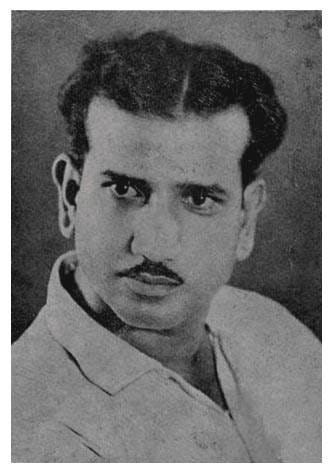Tributes to Hindi film music composer of yesteryear, Pandit Shivram, on his 37th death anniversary.

If one tries to think of music directors who gave music to films which had Hindu mythological stories, one can easily recall S. N. Tripathi, Avinash Vyas & Chitragupta. Another composer whose major work was mostly for such films, but is not remembered as much, is Pandit Shivram Krishna also known as Pandit Shivram, or simply Shivram.
Pt. Shivram Krishna was born at Jodhpur on March 22, 1927. He started learning music at the age of 8 under the tutelage of his father Master Tulsidas, who worked with Marwar Record Company, Jodhpur from 1934 onwards. He was later employed in the court of the Maharaja of Jodhpur, Umed Singh as a singer/musician. It was the name and fame of Khemchand Prakash that inspired him to try his luck in films. At the age of 16, he went to Lahore where he worked under Pandit Amarnath and Master Ghulam Haider for around three years, only to return to Jodhpur at the time of partition. From the year 1948 till 1950 he worked as a music director with His Masters Voice in Lucknow, and then made his way to Mumbai in 1951.
At Mumbai, Pt. Shivram was given his first break by V. Shantaram, who signed him for two of his films — Teen Batti Chaar Raasta (1953) and Surang (1953). The music of both the films was appreciated and the films became silver jubilee hits. Besides these, V. Shantaram gave him two more films in 1960 — ‘Phool Aur Kaliyan’ and ‘Kaale Gore’, the first winning the National Award for Best Children film, while the second remained unreleased. He used the voices of V. Shantaram’s daughters Charusheela and Madhura in these children films.
Following the success of his initial films, Pt. Shivram caught the attention of Dhirubhai Desai and Nakhshab Jarchavi, who signed him for their next films, Oonchi Haveli (1955) and Raftaar (1955) respectively. The songs of these two films were also quite successful. Then came Sati Ansuya (1956), another film by Dhirubhai Desai that started the trend and literally sealed his fate as a composer of mythological films. Barring Naya Kadam (1958), a social drama, and Rangeela Raja (1960), a stunt film, and the two children films by V. Shantaram, all the films he got after Sati Ansuya were religious/ mythological films. In all, out of the 23 films he composed for, as many as 14 were religious/ mythological films.
Despite composing some good songs for these films, the success he got with his initial films could not be repeated given the limited popularity of such films and similarity in the genre of songs. Barring a few songs from Shravan Kuman (1960), Kan Kan Mein Bhagwan (1963) and Sati Naari (1965), most of the songs are all but forgotten. ‘Tum Naacho Ras Barse’ by Mahendra Kapoor in Sati Naari fetched Pt. Shivram the Swami Haridas Award in 1966.
The last two Hindi films of Pt. Shivram were Sampoorna Teerth Yatra (1970) and Mahapavan Teerth Yatra (1975), both of which have the unique distinction of featuring what could be the longest Hindi film songs, running 45 and 70 minutes respectively. Both these songs were about the various places of pilgrimage in India and were almost similar in tune and structure. Interestingly, he had also composed two more songs on similar lines in Durga Pooja (1962) and Kan Kan Mein Bhagwan (1963).
Pandit Shivram gave music for various regional languages such as Rajasthani, Bhojpuri, Punjabi, Haryanvi, etc. He was the default composer for Rajasthani films all through the 1960s, starting with the first Rajasthani film Babasa Ri Ladli (1961). He also composed for several Marwari and classical music non-film albums. As a proficient Harmonium player, he teamed with table-nawaaz Ustaad Nizamuddin Khan to produce a classical album. Pandit Shivram was as good a vocal artist as he was a harmonium player. He sang in films like Oonchi Haveli, Rangeela Raja, Sati Ansuya, Badrinath Yatra, etc.
The lyricists Pt. Shivram worked with were more or less decided by the films he worked in. While he worked with the likes of Asad Bhopali, Shevan Rizvi, Pyare Lal Santoshi, Nakhshab Jarchavi, etc. in his non-mythological films, predominantly ‘Hindi’ writers like Bharat Vyas, Kavi Pradeep, Neeraj, Madan Bharti and Pt. Indra wrote for his mythological films. Pt. Indra and Bharat Vyas were his prime contributors for Rajasthani films.
Pandit Shivram died in February 1980 leaving behind a family of musicians. His daughter Jayshree Shivram is a singer. Two of his sons, Jugal Kishore and Tilak Raj jointly composed for a few Hindi films, debuting with Bheegi Palkein (1983). His third son, Naveen Shivram had started his musical career with giving music for the serial Apnapan in 1999 and went to compose for a few small time Hindi films and some Rajasthani film and non-film albums as well. Another son, Mukesh, was also a composer and is no more.
Courtesy-
Write up- Aditya Pant & Ramaswamy Narayanan
Image- Imprints and Images of Indian Film Music
